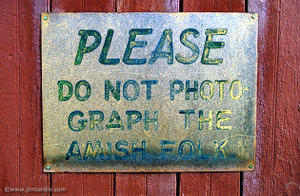What do Amish think about atheists?
Reader Stella shared some thoughts on the “Joining the Amish after 50” post:
Perhaps I’m an unusual atheist but I’ve always admired the Amish philosophy and lifestyle, despite lacking the necessary Faith Trigger to join them. However, I was brought up by atheist parents and taught to respect all genuine engagements with life’s questions, religious or not.
While I’m content with my atheism, as well as with my family and career, I thought I’d mention that you don’t have to be religious to lament today’s lack of ethics, close communities or awareness of life’s deeper significance, or to have serious reservations about the corruptive influence of technology.
Values based on compassion, humility and plain living are always admirable, not just for our individual psychological welfare but the health of societies and the planet. And, of course, whether there’s a God or not, it’s possible to live in a similarly plain life without joining the Amish.
I think Stella makes an interesting point. The values she mentions are pretty important to society functioning, whether a society of atheists or believers. This seems particularly poignant with London, and other UK cities, burning this week.
Amish and atheists
Stella’s thoughts on Amish and plain values made me think about something else. What do Amish think about atheists?
 I guess that’s a question for the individual. I’ve written a bit on Amish thoughts on other religions. To generalize, Amish have a healthily humble view of other faiths. The simplified version: there are different ways of getting to Christ, and who are we to condemn yours.
I guess that’s a question for the individual. I’ve written a bit on Amish thoughts on other religions. To generalize, Amish have a healthily humble view of other faiths. The simplified version: there are different ways of getting to Christ, and who are we to condemn yours.
As deep believers, I think Amish would hope that atheists would eventually find a way to God. Most wouldn’t try too hard to convince the atheist though. Amish don’t proselytize, for the most part. At least not in the way we tend to think of it.
I’ve known some atheists, and had a couple as friends. They aren’t too common. Less than 2% of the US population call themselves atheists (much higher in Europe, though).
Some come across as contemptuous of religion. Others, like Stella, are respectful of people of faith. For their part I’ve found atheists are turned off when religious people try to “change their minds”.
Atheists among us
Atheism has entered the public square in recent years, with prominent atheists publishing books and speaking out about their non-faith. It seems to be part of the greater discussion on religious tolerance which has emerged over the past decade.
I remember reading something on this during the last presidential elections. It was regarding candidate Mitt Romney, a Mormon.
The thrust of the piece was: yes, as a culture we could probably accept a Mormon president (we once asked the same thing about Catholic presidents, then elected JFK)–but could Americans accept an atheist one?
It’s an interesting question. Whether we apply it to our presidents or our neighbors.
America is a Christian-majority nation. I think most Christians pretty readily tolerate different strains of Christianity, even if they don’t agree with them. We also accept most non-Christian faiths. But I’m not so sure about atheism.
Actually, I don’t think people think about it much. Since atheists are so uncommon, I think your average person finds them a bit “weird”, for lack of a better word. And when I say atheist, I don’t mean people who simply don’t attend a church. I mean those who hold the belief that there is no God.
I think people find something deeply unsettling about that. Even though they might be upstanding citizens, full of the values that Stella shares above.
What do you think?
Photo credit: Billy Frank Alexander






Internet Atheist
Christians like to reason, as well.To assume we are irrational is rather insulting. Also, you generalize your entire generatio, making assumptions that they are all agnostic or atheist. This it’s simply untrue. You do have many valid points, however. Would You read the post above yours and give me your thoughts?
Found in Dead Sea Scrolls by Arabs: Written by David approximately 1000 years BC (that’s a thousand years BEFORE Jesus Christ,Yep!) PSALM 14,Verse1️⃣
“The FOOLhas said in his heart❤️,There is no God.”
I encourage you to reread the post you are responding to. I did not directly accuse Christians of being unreasonable, nor did I comment on the religious status of my generation.
Your post points to some books for me to read and states that they are evidence. I will politely decline your offer the same way I imagine you would politely decline this reading. If you wish to persuade someone of something, the most courteous way to do so is to present an argument. I say this after having been presented with the Quran, a book series pertaining to scientology, and one regarding Hinduism as if they were arguments for one conclusion or another. If you are more willing to read other people’s recommended reading, feel free to check out Bertrand Russel’s Value of Philosophy.
Your post then moves to state that morality originates from a higher power. I will respond by stating that I am a materialist and not a substance dualist. I do not believe morality exists as anything other than an idea or social construct, much like words or numbers. I believe the behavior of social animals can be explained as a product of evolution. This would explain why some people seem to be born with certain moral attitudes, whilst others don’t. I don’t see the difference between labeling a certain morality objective or legitimate and saying you agree with that morality.
Your series of rhetorical questions starting with “If we, without knowledge from a higher power, all know the difference between right and wrong, why are we so at odds?” I’ll answer with variability of moral sensibilities. Some people feel remorse or reluctance towards certain actions, and some people don’t.
That’s about as much of a response as you’re going to get from me. If you’re looking for someone to argue with, go to a youtube comments section on a video criticizing religious arguments. I’m sure if you take inventory of the arguments in the books you’ve cited, you’ll see quite a few of those arguments addressed by youtubers(such as TheThinkingAtheist). If not, I bet said youtubers would be more than happy to entertain whatever arguments you’ve got.
I just came here to state that I admire the Amish for the traits they demonstrate that are so lacking in my peers, but lament the fact that I’ll never be welcomed into their communities because of religious differences.
Internet Atheist
Why do you assume I want an argument. I hate arguing and I hate confrontation.
Stating an opinion and asking for your opinion do not constitute an argument. I believe people can disagree without arguing.
It does sound like you are calling Christians, and anyone with faith in God, unreasonable. The reason I state this is that you basically say you believe in evidence- based reasoning. The assumption, based on what you say regarding evidence and reason, is that people of faith lack both.
You also do lump your entire generation together as lacking certain things. This is a blanket judgment that I feel is incorrect for two reasons–you don’t know every person from your generation and therefore, cannot make an accurate judgment of their ethics. No one could. Two, anyone of your generation who has accepted Christ or follows a moral set of beliefs based on ethical religious practices may possess some of these traits due to a cultural upbringing but would not possess all of them because they would have been taught differently.
I’d like to say that my questions are not rhetorical. I’m familiar with the Thinking Atheist and find his information to be lacking I sound theological knowledge.
We all learn from books. The reason I list them is because, while a person can discuss certain points on a blog, it’s impossible to do much justice in such a forum. I will gladly look up the book you mentioned. We should all be open to knowing the arguments of those with whom we agree and disagree.
Atheism in the family
what do amish parents do if one of their children becomes an atheist?
Acceptance
I have good Amish friends, in fact entire families who accept me for what I am and the things I do and say. I’ve been up front with all my Amish friends revealing my atheism. I’ve been accepted by them. Amish, at least the ones I know, unlike the English, do not judge others by their beliefs, if they judge them at all. Not one Amish person has ever chastised or criticized me for my “lack of faith.” And they’ve never tried to convert me to Christianity. When I partake meals with the Amish, I remain silent for the pre and post prandial prayers, showing my respect for them.
My wife, who happens to be a Lutheran Christian, and I are considered to be “English mommy and dawdy by the children in one particular family with whom we have very strong ties. These children are treated the same as our familial ones. It is an honor to be considered part of an Amish family…and I try to show it at every opportunity.
holey b'gramparents!
Only made it an hour into this thread, realizing it was like a really bad, simple, repeating dream.
As a fact, there is a thing in existence that is listening and gives good things to humans. Zero idea how it is lost on others! What a discrepancy!!
It has even been so jejune as to play three rare songs in a row on a radio station immediately following a ridiculous petition for such. It defies both statistical and astronomical possibility to more than one artist and Ivy League scientist.